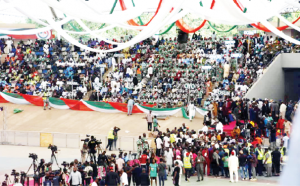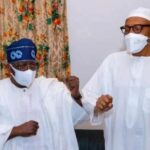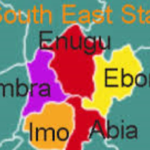TUNDE AJAJA examines how the obscene monetisation of political parties’ primaries and main elections by politicians is undermining the country’s democracy and practical ways of curbing the dreadful practice
Globally, one prime inherent feature of democracy as distinct from other forms of government is the freedom of the citizens to choose their leaders, and elections, starting with primaries, present them that golden opportunity.
That power to choose, according to analysts, is the real dividend of democracy, not the infrastructural development Nigerian politicians always allude to. They pointed out, agreeably, that some of the lasting infrastructure in Nigeria today was built by military dictators.
“Many people think democracy is about what they call dividends of democracy, but that is the mistake they make,” said the Chairman, Partners for Electoral Reform, Mr Ezenwa Nwagwu. “The military will give you roads, construct dams, build schools, provide jobs and even provide free education, but they take away your choice, which voting gives you. So, that power of choice is the most important value of democracy,” he added.
Stressing the enormous power embedded in that freedom to choose, the 32nd President of the United States, Franklin D Roosevelt, also said, “Democracy cannot succeed unless those who express their choice are prepared to choose wisely. The real safeguard of democracy, therefore, is education.”
Then, the revered Catholic Bishop of Sokoto Diocese, Matthew Kukah, alluded to this in a recent interview when he said, “A good number of the operators of this system don’t understand the ingredients of democracy. They just think democracy is about building roads and they point you to the infrastructure they are working on. No. The basis and the things that make democracy what it is are intangible. They are about freedom of expression, and expanding the frontiers of human imagination and thinking.”
 Since independence, the current Fourth Republic is Nigeria’s longest uninterrupted democracy and hopes are high that the country will continue to consolidate the gains made over the years.
Since independence, the current Fourth Republic is Nigeria’s longest uninterrupted democracy and hopes are high that the country will continue to consolidate the gains made over the years.
However, one major challenge threatening the limping democracy is how citizens’ power to choose their leaders is increasingly being subjugated by the obscene monetisation of the process by aspiring political office holders and political parties. This was overwhelmingly evident again in Saturday’s governorship election in Ekiti State and the recently held party primaries, especially those of the ruling All Progressives Congress and the main opposition Peoples Democratic Party.
It was a windfall for delegates across the country as aspirants strove to outspend one another in sharing to them huge sums of money, including the dollars viable businesses couldn’t access to sustain their operations.
The reason for this desperation is clear; the level of poverty in Nigeria – afflicting about 90 million people at once – is frightening, and with the lucrative nature of political offices, it is somewhat explicable that politicians go to any lengths to get into or retain political offices.
Sadly, bribing delegates and voters during main elections – known as vote-buying – is one of the strategies politicians make things go their way.
However, it used to be done discreetly. But in the just concluded primaries, delegates were bribed openly and some politicians, who lost the primaries, even demanded refunds from the delegates and concerned party leaders openly.
Among the classic examples that abound across the country was the drama that played out in Kaduna State when Adam, the son of former Vice-President Namadi Sambo, demanded a refund of the N2m he gave to each of the PDP delegates for the Kaduna North Federal Constituency primary.
Adam, who scored only two out of the 37 votes and came a distant third despite spending tens of millions, asked the aspirants to return his money.
Defending himself, he said he wasn’t the only aspirant to ask for a refund, and that some party leaders were privy to the transactional arrangement.
He added, “Delegates themselves are aware of the directives given by the major stakeholders of the PDP in the Kaduna North Constituency that any sums given to delegates by various aspirants for their support should be returned to those unsuccessful in their primary elections.”
While that brazen admittance of bribery had yet to simmer down, a senatorial aspirant in Ondo State was also said to have retrieved the vehicles he gave some party leaders after he lost the primary.
Still in Kaduna State, the Centre of Learning, a delegate identified as Tanko, who made millions, shared his windfall with his kinsmen. He was said to have assisted many with cash, school fees, hospital bills and even jerseys for young people, all from the ‘proceeds’.
In some other instances, videos emerged of aspirants or their representatives sharing money to delegates in nylon bags.
Interestingly, despite all the dollars that exchanged hands, there was no report of any arrest made by the operatives of the Economic and Financial Crimes Commission who stormed the venues of the APC and PDP presidential primaries in Abuja.
This oddity or transactional voting that elections in Nigeria have become, rightly fuels insinuations that money will again play a major role in who wins the various elections next year. In addition, an important office like the presidency may go to the highest ‘bidder’. Interestingly, the candidates of the two major parties, APC and PDP, are big spenders.
“The practice of subverting the will of the people through money started gaining currency in 1998 when we were in the transition to civil rule,” Nwagwu said while tracing the history of the ugly trend.
He added, “We knew how (former President Olusegun) Obasanjo emerged as the PDP candidate. He contested against Dr Alex Ekwueme. In the morning of the election in Jos, Plateau State, we knew it was clear he would carry the day.
“But Obasanjo was brought out of prison and a retired General boasted that he provided N300m. Delegates were housed in Abuja and Bauchi, and were driven with mobile policemen escort into the stadium, even though we didn’t see how the N300m was shared to the delegates in their hotel rooms. We seem to have a historical amnesia in this country.”
He said after Obasanjo became the president, he appropriated the party’s structure and machinery to himself and all his successors till date reinforced “all the dubious things that have diminished competitiveness in our electoral process.”
“When they took away free contest, they have to bribe people instead, and that is what see today.”
The Independent National Electoral Commission in its ‘Report of the 2019 General Elections’ identified vote-buying as one of the challenges the polls faced. It warned that it “will continue to mar the integrity of elections if not properly and promptly addressed.”
Beyond the money shared to delegates, some analysts argue that the high cost of expression of interest and nomination forms was also tantamount to monetising the process. The most criticised was the N100m APC sold its presidential forms.
The Co-founder and Director of Programmes, YIAGA Africa, Ms Cynthia Mbamalu, stressed that the cost of the forms did not only exclude many from participation, those who had no money to share to delegates were also disadvantaged.
She added, “The increasing role money is playing in our elections is not just worrying, it also poses a major threat to our democracy and it has further entrenched the politics of exclusion.
“The delegate system became a dance of shame. This was one election where people shared money openly and went after the delegates who did not vote for them to retrieve their money. The fact that it was done with such disregard for any sense of value or respect to democratic principles is worrying.
“It means the contest was not free and democratic, because it’s almost about the highest bidder. That affects the quality of leaders that emerge from these parties as candidates and it limits the choices of voters as to who they could vote for in the elections.”
Similarly, the Executive Director, Policy and Legal Advocacy Centre, Mr Clement Nwankwo, said the implementation of the Justice Mohammed Uwais-led committee report on electoral reforms, which created an electoral offences commission, would have helped to deal with such problems.
He noted that it was brazen for politicians to bribe delegates and ask for a refund, but that the practice might continue to fester because nobody had been punished.
He called for the implementation of the recommendations of the Constitution and Electoral Reform Committee, headed by Senator Ken Nnamani, and which he was a part of.
He added, “The President set up that committee, and we recommended the creation of an Electoral Offences and Political Parties Regulation Commission. Those bills are still in the National Assembly and PLAC has engaged the relevant committees to hold public hearings so they can be passed.
“When this body is in place, it can take complaints and work with security agencies.”
He added, “If politicians spent this that much to become candidates, you can imagine how the general elections will be influenced by money. So, it’s a no-brainer that these people steal public funds and so development is severely affected.
“The connection between this volume of money for campaigns and poor governance is stark. That’s why you see people remain in government perpetually because they are hopping from one position or the other without necessarily being deliberate about service delivery.”
Speaking further, Nwagwu stated that if a few moneybags, instead of moneygabs, continue to own the parties, they would continue to exclude others from participation.
Nwagwu added, “The nature of our political parties enables money politics and ownership, but does not encourage membership. There are owners of these political parties, like the President and governors, because they fund the parties.
“Let political parties be funded by members so we can remove the idea of a few persons who have money owning the parties. What we have is that when the owners of the political parties make a choice, they either give money to other aspirants to assuage their desire to contest or they pump money into the process so that they can have their way. We need to restore healthy competition and contest within our leadership recruitment process, starting from the party level.”
He asked party members to increase their stakes in the parties by paying membership dues, making donations and sacrifices. “If the people don’t own the party, they can’t question how it’s run,” he added.
While calling on people to condemn the monetisation of the process in its entirety, he said, “A man (Peter Obi) who joined the Labour Party three days earlier became the party’s presidential candidate. He must have (allegedly) funded the transportation and accommodation of those people during the primary in Asaba, Delta State, looking at the concessions he enjoyed. In what ways is that different from what happened in Abuja? When did the party’s NEC meet to give him a waiver?”
Asked if the indirect primary option escalated the bribery, Nwagwu said since it was about the motive, all forms of primary could be influenced. “It is when members own the party that competition and credible contests can return,” he added.
He called on the media and civil society organisations to focus on the political parties like they do INEC and the security agencies, which he said had produced incremental results in their activities.
Also, Mbamalu, while speaking to the issue, explained that leaving political parties to do what they liked gave them the overbearing power to monetise the process.
She stated, “After these elections, we need to look at the Electoral Act and examine the opportunity to put a cap on what parties can charge for forms.
“We need to engage the political parties in their leadership recruitment process because they are now becoming a major threat to our democracy rather than helping to build it. Parties should have functional members and registers so they can raise funds internally. If a party claims to have 40 million members, if the members pay N1,000 every year, they can internally raise a lot of money.”
In consonance with Nwagwu’s calls for party members to be active, Mbamalu said when members begin to pay dues, it would promote internal democracy, participation and they would have a sense of ownership rather than moneybags taking absolute control of the parties.
She added, “When parties are more intentional in recruiting members, the members are active, they understand what the party stands for, the essence of the leadership recruitment process, the party’s constitution, the Nigerian constitution and even democracy itself, the delegates that will emerge from among them will be people who understand the values of their votes in the primary elections.
“There are delegates, who do not even understand the essence of primaries, and that is why they are willing to sell their votes to the highest bidder. Delegates have become the kingmakers and have taken the power away from the party members.”
She also called on the media and the CSOs to engage the parties while encouraging Nigerians to become active members of political parties. She said that was one way to make demands within the parties rather than staying criticising from outside.
“This is a call on the electorate too. Nothing stops the voters from protesting through the ballots against parties that merely sold their tickets to the highest bidders. It’s time we started to punish parties for violating our democratic principles and even abusing the whole concept of democracy, because if they can’t hold credible primaries, how can they uphold democratic tenets on a larger scale?” she added.
She asked anti-graft agencies to investigate the sources of election funding, adding that tax authorities should ensure that those spending huge sums on electioneering pay their taxes.





